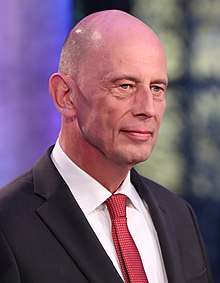Next Thuringian state election
The next Thuringian state election will be held no later than between August and December 2024 to elect the 8th Landtag of Thuringia. The current government is a minority government consisting of The Left, the Social Democratic Party (SPD), and The Greens, led by Minister-President Bodo Ramelow of The Left.
| |||||||||||||||||||||||||||||||||||||||||||||
All 90 seats in the Landtag of Thuringia 46 seats needed for a majority | |||||||||||||||||||||||||||||||||||||||||||||
|---|---|---|---|---|---|---|---|---|---|---|---|---|---|---|---|---|---|---|---|---|---|---|---|---|---|---|---|---|---|---|---|---|---|---|---|---|---|---|---|---|---|---|---|---|---|
| |||||||||||||||||||||||||||||||||||||||||||||
| |||||||||||||||||||||||||||||||||||||||||||||
There is currently a cross-party agreement to hold an early Landtag election on 25 April 2021.[2]
Election date
According to § 18 of the Thuringian Electoral Law for the Landtag,[3] the Landtag election must take place on a Sunday or public holiday at the earliest 57 months after the beginning of the current parliamentary term on 5 February 2020 and at the latest 61 months after, i.e. at the earliest in August 2024 and at the latest December 2024.[4]
According to the Thuringian Constitution, an early election may be held if, at the request of one-third of its members, the Landtag votes with a two-thirds majority to dissolve itself. This may also occur if the Landtag does not vote confidence in a Minister-President within three weeks of a failed vote of confidence in the incumbent. The motion to dissolve the Landtag may only be voted on between the eleven and thirty days after its submission. If passed, the election must then take place within 70 days.
On 21 February 2020, The Left, CDU, SPD, and Greens came to an agreement to schedule a new election for 25 April 2021.[2]
Background
Previous election
In the previous state election held on 27 October 2019, The Left became the largest party for the first time in any German state, winning 31.0% of votes cast. The Alternative for Germany (AfD) made the largest gains, increasing its voteshare by almost 13 percentage points and became the second largest party with 23.4%. The Christian Democratic Union (CDU), which had previously been the largest party in the Landtag, lost almost 12 points and fell to third place with 21.7%. The Social Democratic Party (SPD) placed fourth on 8.2%. The Greens narrowly retained their position in the legislature, winning 5.2% of votes. The Free Democratic (FDP) entered the Landtag for the first time since 2009, exceeding the 5% electoral threshold by just 73 votes.[5]
Incumbent Minister-President Bodo Ramelow of The Left had led a coalition government of The Left, SPD, and Greens since 2014. The Left's gains were offset by losses for the SPD and Greens, and the coalition lost its majority.
Government crisis
Election of Kemmerich
On 5 February, the Landtag narrowly elected the FDP's state leader Thomas Kemmerich as Minister-President, with 45 votes to incumbent Bodo Ramelow's 44. Kemmerich was elected with the support of the FDP, CDU and, controversially, the AfD. This was the first time AfD had been involved in the election of a head of state government in Germany. The apparent cooperation of the three parties was viewed by some as breaking the cordon sanitaire around AfD which had been in place since its formation, in which all other parties sought to deny AfD government or political influence, refusing to negotiate or work with them on any level. This sparked major controversy nationwide, with many politicians expressing their outrage, including outgoing Minister-President Ramelow, who drew parallels between AfD's role in Kemmerich's election and the rise of the Nazi Party. Protests were held in several German cities after the election, including in the Thuringian capital of Erfurt, where 1,000 protestors demonstrated outside the Landtag as Kemmerich delivered his acceptance speech inside.[6] Federal Chancellor and former CDU leader Angela Merkel described it as "unforgivable" and condemned her party's involvement, stating: "It was a bad day for democracy, a day that broke with the long and proud tradition of the CDU's values. This is in no way in line with what the CDU thinks, how we have acted throughout our party's existence."[7] Federal SPD leaders Norbert Walter-Borjans and Saskia Esken stated they would withdraw their party from the federal CDU–SPD government if Kemmerich did not resign immediately.[8]
A letter sent to Kemmerich by AfD leader Björn Höcke shortly after the 2019 election led to speculation that AfD's support for Kemmerich was planned and coordinated. In the letter, Höcke offered his party's support for either a non-partisan technocratic government or an FDP minority government.[9] Despite this, Kemmerich and his party denied having any knowledge of AfD's intentions.[7]
On 6 February, Kemmerich announced his resignation, but stated that he would seek to call an early election before leaving office. He stated his intent was "to remove the stain of the AfD's support for the office of the premiership". However, on 8 February, he announced his resignation was "effective immediately".[10]
On 14 February, state CDU leader Mike Mohring announced his resignation.[11]
Election of Ramelow
The Left and CDU held talks on 17 February, seeking to resolve the crisis. Bodo Ramelow suggested that former CDU Minister-President Christine Lieberknecht lead a three-member transitional cabinet which would serve until a new election was held, which he suggested should take place 70 days later. The CDU rejected this prospect, stating that a full cabinet should take office and that a state budget should be passed before new elections are held.
Following further discussions, The Left, CDU, SPD, and Greens announced on 21 February 2020 that they had reached an agreement to hold a new election for Minister-President on 4 March 2020, and a new state election on 25 April 2021. The four parties stated they would support Bodo Ramelow for Minister-President, and that he will lead an interim government for the next 13 months until the election is held. This government will comprise the same red-red-green arrangement which governed Thuringia from 2014 to February 2020, but will not seek to pass a budget before the election.[2] Between them, the four parties hold 63 of the 90 seats in the Landtag (70%), more than the two-thirds required to dissolve the Landtag and trigger an early election.
On 2 March, Björn Höcke announced his candidacy for Minister-President in the upcoming vote. In response, an FDP spokesperson said that the FDP may not attend the vote, stating: "We reject both candidates and also don't wish to abstain. In which case our only remaining possibility is to not being physically present at the election." The leadership of the Young Union, the youth branch of the CDU, also announced its opposition to CDU support for either candidate. However, the Thuringia CDU stated it intended to be present at the vote.[12]
On 4 March, Bodo Ramelow was elected Minister-President by the Landtag after three rounds of voting. In the first two rounds, The Left, SPD, and Greens voted for Ramelow, while AfD voted for Höcke, the CDU abstained, and the FDP did not vote or abstain. In the third round, Höcke withdrew, and Ramelow was elected with 43 in favour, 23 against, and 20 abstentions.[13]
Parties
The table below lists parties currently represented in the 7th Landtag of Thuringia.
| Name | Ideology | Leader(s) | 2019 result | |||
|---|---|---|---|---|---|---|
| Votes (%) | Seats | |||||
| Linke | The Left Die Linke |
Democratic socialism | Susanne Hennig-Wellsow (leader) Bodo Ramelow (Minister-President) |
31.0% | 29 / 90 | |
| AfD | Alternative for Germany Alternative für Deutschland |
National conservatism | Björn Höcke Stefan Möller |
23.4% | 22 / 90 | |
| CDU | Christian Democratic Union of Germany Christlich Demokratische Union Deutschlands |
Christian democracy | Mike Mohring | 21.3% | 21 / 90 | |
| SPD | Social Democratic Party of Germany Sozialdemokratische Partei Deutschlands |
Social democracy | Wolfgang Tiefensee | 8.2% | 8 / 90 | |
| Grüne | Alliance 90/The Greens Bündnis 90/Die Grünen |
Green politics | Ann-Sophie Bohm-Eisenbrandt Bernhard Stengele |
5.2% | 5 / 90 | |
| FDP | Free Democratic Party Freie Demokratische Partei |
Classical liberalism | Thomas Kemmerich | 5.0% | 5 / 90 | |
Opinion polls
Party polling
| Polling firm | Fieldwork date | Sample size |
Linke | AfD | CDU | SPD | Grüne | FDP | Others | Lead |
|---|---|---|---|---|---|---|---|---|---|---|
| Infratest dimap | 30 Jul–4 Aug 2020 | 1,000 | 32 | 20 | 24 | 10 | 6 | 4 | 4 | 8 |
| INSA | 15–22 Jun 2020 | 1,016 | 35 | 22 | 22 | 8 | 6 | 3 | 3 | 13 |
| INSA | 14–19 May 2020 | 1,010 | 34 | 22 | 21 | 8 | 7 | 5 | 3 | 12 |
| INSA | 25–31 Mar 2020 | 1,018 | 37 | 23 | 18 | 7 | 7 | 4 | 4 | 14 |
| INSA | 5–9 Mar 2020 | 1,034 | 38 | 25 | 15 | 8 | 6 | 4 | 4 | 13 |
| INSA | 10–13 Feb 2020 | 1,006 | 40 | 25 | 14 | 7 | 6 | 4 | 4 | 15 |
| Infratest dimap | 7–10 Feb 2020 | 1,007 | 39 | 24 | 13 | 10 | 5 | 4 | 5 | 15 |
| Forsa | 6 Feb 2020 | 1,003 | 37 | 24 | 12 | 9 | 7 | 4 | 7 | 13 |
| INSA | 5–6 Feb 2020 | 1,006 | 34 | 23 | 19 | 6 | 6 | 7 | 5 | 11 |
| Infratest dimap | 21–25 Jan 2020 | 1,000 | 32 | 24 | 19 | 8 | 6 | 6 | 5 | 8 |
| 2019 state election | 27 Oct 2019 | – | 31.0 | 23.4 | 21.7 | 8.2 | 5.2 | 5.0 | 4.9 | 7.6 |
Minister-President polling
| Polling firm | Fieldwork date | Sample size |
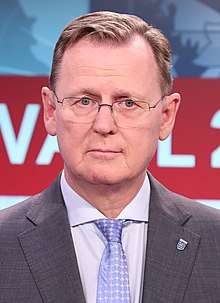 |
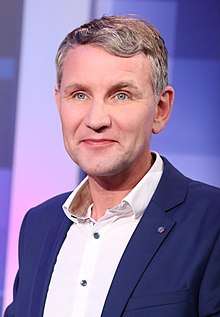 |
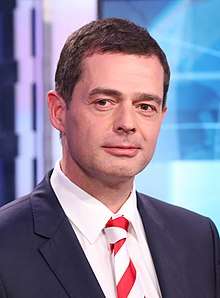 |
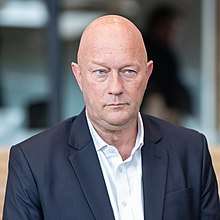 |
None/Unsure | Lead | |
|---|---|---|---|---|---|---|---|---|---|
| Bodo Ramelow The Left |
Björn Höcke AfD |
Mike Mohring CDU |
Thomas Kemmerich FDP |
Christoph Kindervater Independent | |||||
| INSA | 5–9 Mar 2020 | 1,034 | 56 | 16 | – | – | – | 21 | 40 |
| Forsa | 6 Feb 2020 | 1,003 | 64 | – | 9 | 6 | 3 | 18 | 55 |
| Infratest dimap | 21–25 Jan 2020 | 1,000 | 60 | 9 | 19 | – | – | 10 | 41 |
Notes
- The Left, the CDU, the SPD, and The Greens made an agreement that an interim Left-SPD-Green government under Bodo Ramelow would continue, with CDU abstention until the next state election, which was agreed to be held on 25 April 2021.[1]
- Wolfgang Tiefensee was elected on the SPD list in the 2019 election, but resigned from the Landtag in December.
References
- "Troubled Thuringia gets fresh election dates". DW.com. 21 February 2020.
- "Troubled Thuringia gets fresh election dates". Deutsche Welle. 21 February 2020.
- landesrecht.thueringen.de
- Wahltermine in Thüringen, auf wahlen.thueringen.de
- "Wahlen in Thüringen". Thüringer Landesamt für Statistik.
- "Desolation and hope in German city of Erfurt after far-rgiht vote". Deutsche Welle. 9 February 2020.
- "Germany AfD: Thuringia PM quits amid fury over far right". BBC. 8 February 2020.
- "Merkel Just Gave Her Party Chief a Lesson in Crisis Management". Bloomberg. 8 February 2020.
- "Nach Landtagswahl: Höcke wirbt für Regierung mit AfD-Unterstützung". mdr.de. 6 November 2019.
- "Germany: Thuringia state premier Kemmerich quits, 'effective immediately'". Deutsche Welle. 8 February 2020.
- "Thuringia AfD scandal claims another scalp in Merkel's CDU". Deutsche Welle. 14 February 2020.
- "Boycott threats after AfD fascist stands for Thuringia premier". The Guardian. 4 March 2020.
- "Germany's Thuringia gets left-wing state premier in re-run vote". 4 March 2020.
.jpg)
